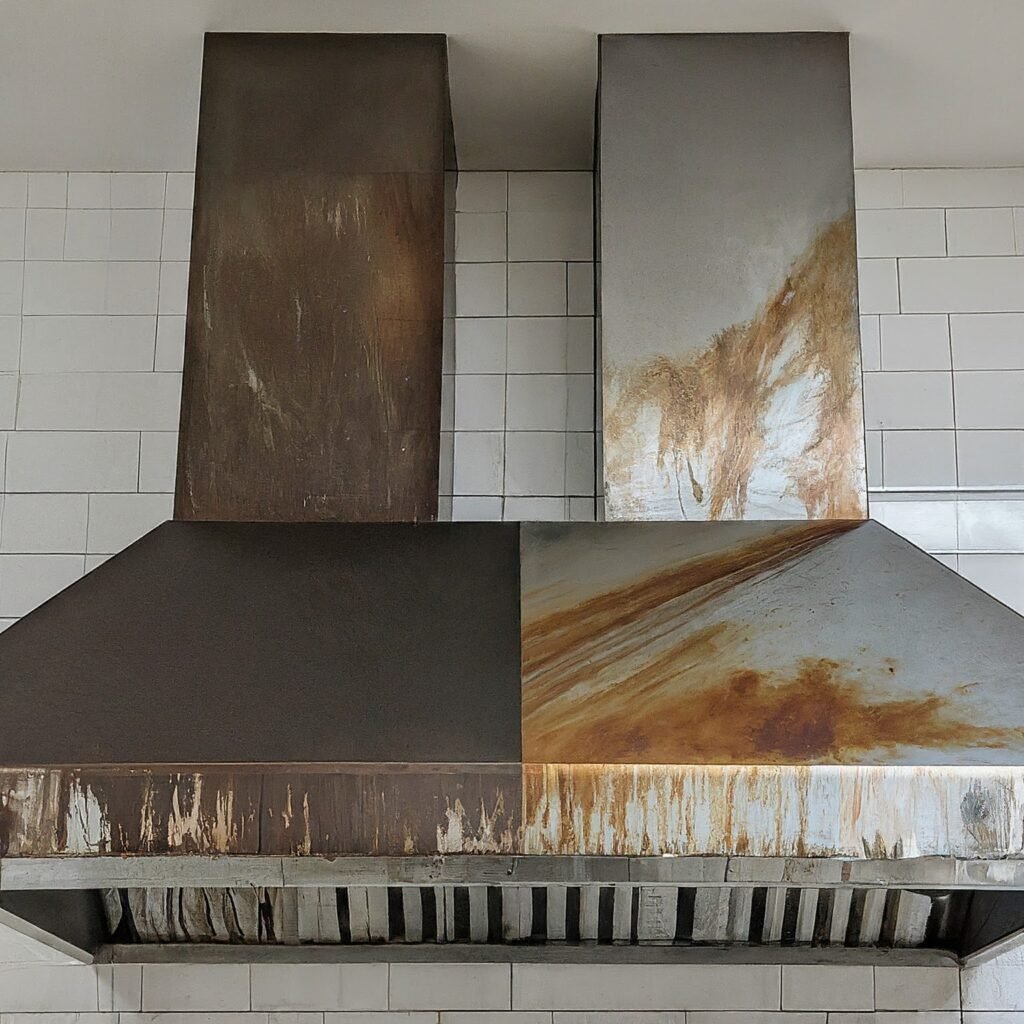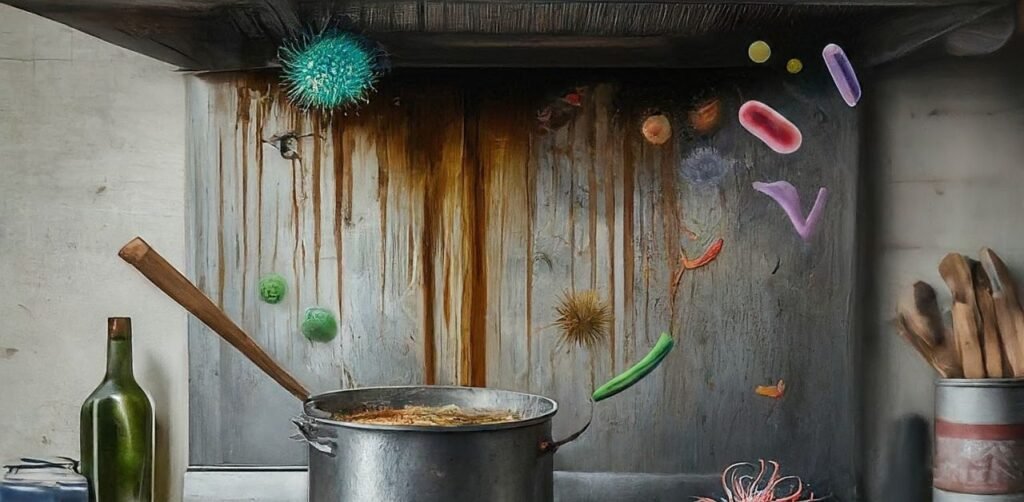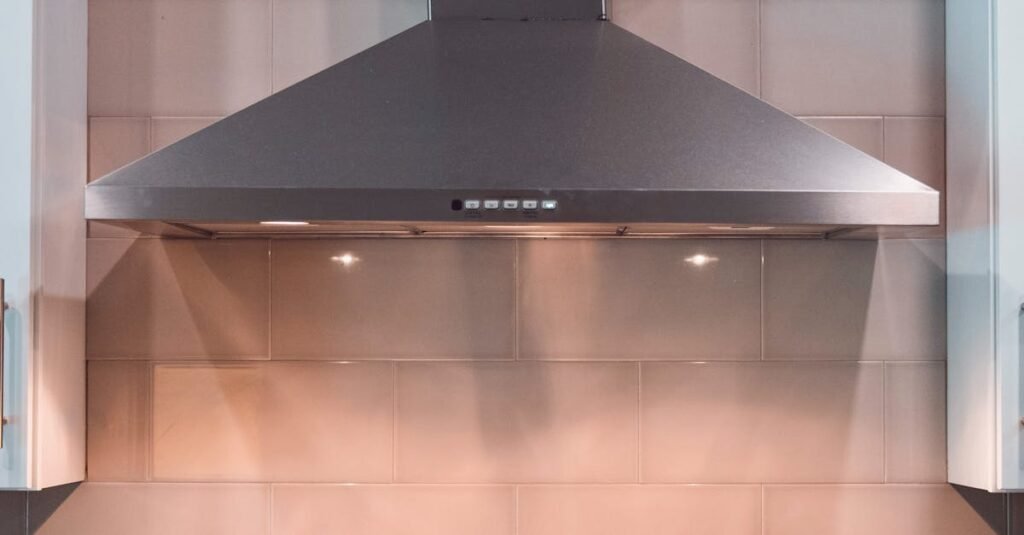kitchen exhaust hood cleaning is a critical but often overlooked aspect of maintaining a safe kitchen.
Every time you fire up your stove, an invisible danger grows. It’s not just about the food you cook but the unseen buildup in your kitchen exhaust hood.
Whether you’re a home cook or a restaurant owner, the greasy residue that accumulates in your exhaust system is a silent, yet potentially deadly, hazard.
This buildup is not only a fire risk but also a hidden threat to your health, fostering an environment ripe for bacterial growth and air quality issues.
Neglecting kitchen exhaust hood cleaning can turn your kitchen into a ticking time bomb, waiting to go off.
Let’s delve into why this seemingly mundane task is one of the most critical safety measures you can take in your kitchen.
Why is Proper Ventilation Important in Kitchens?

Proper ventilation in kitchens, whether in a busy restaurant or a family home, is essential for maintaining a safe and healthy environment.
Ventilation systems help remove smoke, steam, and airborne grease produced during cooking.
These contaminants can accumulate on walls, ceilings, and other surfaces, creating an unhealthy atmosphere if not properly vented.
Kitchen exhaust hood cleaning is a crucial aspect of maintaining this ventilation.
For example, in a residential kitchen, lack of proper ventilation can lead to moisture buildup, promoting mold growth and increasing the risk of respiratory problems for household members.
In commercial kitchens, the stakes are even higher, as improper ventilation can lead to severe health code violations and potential closures.
Why is Kitchen Exhaust Hood Cleaning Crucial?

Kitchen exhaust hood cleaning is vital for several reasons.
Over time, grease and other residues accumulate on the exhaust hood, filters, and ductwork.
This buildup can reduce the system’s efficiency and pose significant safety risks.
For example, a restaurant kitchen that regularly grills or fries food will accumulate grease much faster than one that primarily boils or steams.
This grease is highly flammable and can easily ignite, potentially causing devastating fires.
The National Fire Protection Association (NFPA) reports that cooking equipment is responsible for 61% of restaurant fires, often due to improper maintenance of exhaust systems.
Regular cleaning reduces this risk, ensuring the ventilation system can efficiently remove contaminants and maintain good air quality.
How Often Should Kitchen Exhaust Hoods Be Cleaned?
The frequency of kitchen exhaust hood cleaning varies depending on the type and volume of cooking. For instance, the NFPA 96 standard provides guidelines for cleaning frequencies based on usage.
High-volume cooking establishments, like 24-hour diners or those using solid fuel, should clean their systems quarterly.
Moderate-volume restaurants, such as those that operate five days a week, should aim for semi-annual cleanings.
Low-volume operations, including churches or seasonal businesses, can clean annually.
In residential settings, it’s advisable to clean the exhaust hood at least once a year.
However, if you frequently cook with oils or grease, you should consider more frequent cleanings.
Regular maintenance helps prevent fire hazards, ensures the system’s efficiency, and extends the lifespan of the equipment.
What Health and Safety Regulations Govern Kitchen Exhaust Cleaning?
Both commercial and residential kitchens must consider health and safety when it comes to kitchen exhaust hood cleaning.
In the commercial sector, regulations such as NFPA 96 specify requirements for the design, installation, operation, inspection, and maintenance of ventilation control and fire protection systems.
These standards are designed to minimize the fire risk associated with commercial cooking operations.
Compliance is not just a legal requirement but a critical component of responsible kitchen management.
Failing to adhere to these standards can result in hefty fines, insurance issues, and even business closure.
In residential kitchens, while there might not be strict regulations, following best practices is crucial for safety.
For example, ensuring that the exhaust system properly vents to the outside, rather than recirculating air, helps prevent indoor air pollution.
Homeowners should also be aware of the importance of using proper filters and cleaning them regularly.
Using substandard filters or neglecting maintenance can lead to decreased efficiency and increased fire risk.
Ensuring proper ventilation and regular cleaning can significantly improve indoor air quality, reduce health risks, and prevent potential disasters.
What Happens If We Neglect Proper Cleaning?
Neglecting kitchen exhaust hood cleaning can lead to serious consequences, both from a health and safety perspective.
In homes, greasy and dirty exhaust hoods can result in unpleasant odors and attract pests like cockroaches, which thrive in greasy environments.
More critically, grease buildup can lead to a significant fire hazard.
According to the U.S. Fire Administration, cooking fires are the leading cause of home fires, with many originating in the kitchen due to improper maintenance of exhaust systems.
In commercial kitchens, the risks are even greater.
A fire in a commercial kitchen can cause extensive property damage, costly downtime, and even loss of life.
Additionally, poor ventilation can compromise the air quality, posing health risks to both staff and patrons.
For example, carbon monoxide, a byproduct of gas cooking appliances, can accumulate in poorly ventilated spaces, leading to carbon monoxide poisoning, which is potentially fatal.
Moreover, inadequate ventilation can lead to excessive moisture and humidity, promoting the growth of mold and bacteria.
This can contaminate food and surfaces, increasing the risk of foodborne illnesses.
In a case study, a restaurant experienced a severe outbreak of food poisoning traced back to contaminated kitchen surfaces, highlighting the critical role of proper maintenance and cleaning.
Conclusion
Why Regular Maintenance is a Must…..
Regular kitchen exhaust hood cleaning is essential for anyone managing a kitchen, whether in a commercial or residential setting.
Proper ventilation removes harmful contaminants from the air, prevents grease buildup, and reduces the risk of fires.
Adhering to recommended cleaning schedules and following health and safety regulations ensures that your kitchen remains a safe, healthy, and efficient environment.
By prioritizing regular maintenance, you can protect your property, the health of your family or customers, and ensure the longevity of your kitchen equipment.
Remember, a well-maintained kitchen is not only about aesthetics but also about safety and health.
Don’t overlook the importance of kitchen exhaust hood cleaning in safeguarding your kitchen and those who use it.



